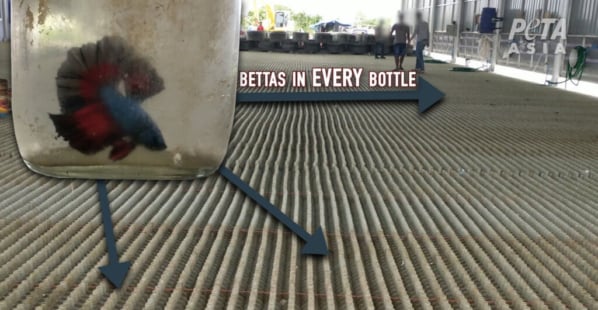Animal-Friendly Science Fair Ideas You’ll Love
Do you have a science fair coming up? Not sure where to start? Use one of our animal-friendly science fair ideas to make sure you have an A+ project that won’t hurt animals. Science should never hurt animals—they aren’t ours to experiment on.
Bonus: These ideas are easy to do at home, if your classes have gone virtual!

We should never use animals or foods made from them for science (or anything else), but we can still observe them in their natural habitats and research online to learn lots about them! So use these interesting, animal-friendly science fair ideas to learn more about animals, let others know how unique they are, and even start conversations about the fact that other animals’ needs, wants, and feelings aren’t much different from ours! ?
1. Where Do Companion Animals Thrive?
Think of friends and neighbors who have animals, and ask if you can observe them for a while. How do domesticated animals like dogs, cats, birds, rabbits, hamsters, etc., behave? What do they do all day? Do those who have an animal friend act differently from those who are the only animal in the household?
Interview people with animal companions and talk to folks who make their animals live outside all the time as well as guardians who let theirs live with them indoors. Do domesticated animals live longer indoors or outdoors? How big is the difference in their lifespans? Why? How are their lives different?
2. Are Sea Animals Similar to Humans?
Research sea animals to find out which ones have surprising similarities to humans. For example, lobsters are pregnant for nine months, just like human mothers. What other things do fish and other sea animals have in common with mammals? Here are some ideas:
- Do they care for their babies?
- Can they feel pain?
- Do they have hearts, and do they bleed the same way?
- Do they have reproductive, respiratory, and digestive systems, too?
- What kinds of talents and extra-special abilities do fish species and other sea animals have that mammals don’t have? (For example, mimic octopuses can use their minds to make their bodies change colors and shapes to look like other types of animals!)
Include information about ways we can help protect them from humans.

3. Are Food Product Labels Misleading to Consumers?
Research different marketing labels—such as “ethical,” “sustainable,” “humane,” “natural,” “cage-free,” “organic,” “fair trade” “free-range,” or “non-GMO”—that food companies use on their products.
What do labels like these really mean about the products? Can they guarantee that animals used for food don’t suffer? Do third-party agencies oversee each business that uses these labels to make sure the standards are being met? How can we make sure we’re eating healthy foods that no animals are harmed for?
 Jo-Anne McArthur | We Animals
Jo-Anne McArthur | We Animals
4. In What Ways Are Different Bird Species the Same?
Research the differences and similarities among bird species and determine whether our current treatment of birds such as chickens and turkeys is logical or justified. Here are some ideas:
- How intelligent are birds? Can they use tools?
- What do chickens, eagles, and parrots have in common?
- Is it OK to put some birds in cages but not others? Why or why not?
- What’s the difference between domesticated turkeys and wild turkeys?
- Can all bird species feel pain?
- In what ways are birds similar to humans? (For example, chickens have dreams.)
- How do different kinds of bird moms take care of their babies?
- What are some things that baby birds (like chickens) can understand?
Include information on ways we can help stop birds from being hurt by humans.

5. Is There Air or Water Pollution in Our Communities?
Examine air pollution by sampling the surfaces of tree leaves or buildings in different areas of your neighborhood. (You can collect samples by rubbing the surfaces with white tissue paper.) Does the amount of pollution vary in different parts of your community? Why is that? What harm do air and water pollution cause? How are humans and wild animals affected? What are the causes of pollution? How can we reduce it?
 © iStock.com/narvikk
© iStock.com/narvikk
*****
Discovering how the world works is seriously cool, and there are so many ways to explore it—without harming any animals! Be sure to check with your teacher to confirm that your science project idea is approved before starting, and don’t forget to ask your parent or guardian or another trusted adult for help putting it together.
Have any questions along the way? Feel free to ask us for help by e-mailing us at [email protected]. And let PETA Kids know how your humane science fair project goes for a chance for it to be featured on our website. ♥




Under 13? Ask your parents bee-fore you continue!